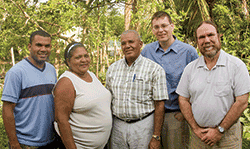
|
|
Ed Quinn had no idea that so much went into producing a pound of coffee.
Or the profound impact that selling that pound of coffee through Fair Trade has on cacao farmers in the Dominican Republic. The farmers are part of CONCADO, a 9,500-member cooperative that markets almost half of its harvest through Fair Trade.
Quinn, UUP’s membership development officer, got to see that for himself after a weeklong April trip to the Dominican Republic with NYSUT and New York State Labor-Religion Coalition (LRC) members. The trip was at the invite of Fair Trade and its LRC partner, Equal Exchange.
“Through the Fair Trade premiums the farmers get for their crops, they are able to invest back into the community,” said Quinn, UUP’s liaison to the LRC. “The cooperative has been able to build schools, buy shoes and school uniforms for their children, and keep families together.”
“One farmer told me through an interpreter how the cooperative has improved his life,” he added. “He said he went from a wood to a cinder block house, which is very important because wood houses don’t stand up to the hurricanes they sometimes get. The Fair Trade premiums have allowed the cooperative to offer free health care to farmers, and truly improve the quality of life there.”
In many ways, Fair Trade is the lifeblood of CONCADO’s farmers. The cooperative was formed in 1985 to find methods to improve the quality of the lucrative cacao crop, which produces some of the finest cacao in the world. Selling their crops collectively through Fair Trade offers the farmers a competitive, stable price for their products.
In return, Fair Trade guarantees a wholesale price that covers more than production costs. These “premiums” must be invested into the community; CONCADO’s farmers determine how and where the profits will be distributed, said LRC International Project Director Maureen Casey, who made the trip with Quinn.
This is not the case in many places in the world, where large corporations exploit the cheap labor available in developing countries, buying products for pennies and pocketing the profits.
“The point of the trip was to learn about the difference Fair Trade makes and why Fair Trade is so important to the lives of so many people,” said Casey. “CONCADO is as close to a union as any farmer’s organization can be in a place like the Dominican Republic. The farmers here are organized.”
During their visit, the contingent met with CONCADO farmers and saw their schools, getting an up-close look at how successful the cooperative’s social programs have been. Quinn said they stayed with the locals during their trip, giving them a true view of the powerful, positive role Fair Trade plays in their lives.
“They told us how Fair Trade has improved their lives, how it has allowed them to send some of their children to university,” he said.
Sure, it costs a little more to buy Fair Trade coffee, tea or candy. But the ripple effect of that purchase is remarkable, said Quinn. “I really think (Fair Trade) extends the union’s social justice philosophy,” he said. “You’re investing your money. It helps raise the standard of living and it supports the rights of workers in countries around the world.”
— Michael Lisi

